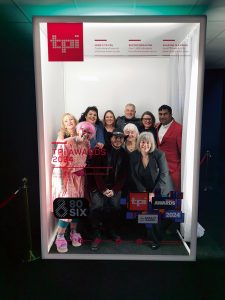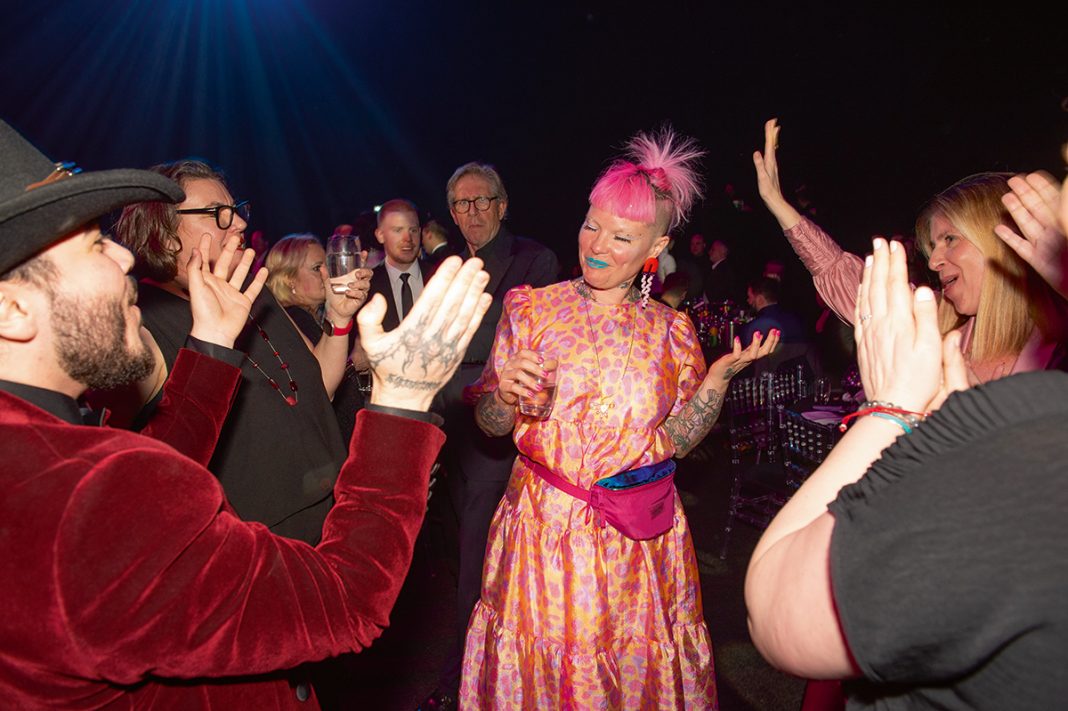Having typically endured post-TPi Awards hangovers, I found myself notably proud, albeit contentedly sober, during the return journey on the Phoenix tour bus from Evolution London to Stockport’s Strawberry Studios. I had spent the entire evening in solidarity with the remarkable collective responsible for orchestrating the event’s first-ever sober table in more than two decades – Roadies in Recovery. Joanne Croxford and the team successfully raised over £3,000 to secure their attendance, with any surplus proceeds earmarked for industry charities. They arrived at table 126 equipped with an array of tea bags and supportive allies, making a bold statement, challenging societal norms, and reshaping perceptions regarding networking at events that may trigger individuals in recovery.
Croxford elaborated on the significance of this milestone: “There’s never been a sober table at the TPi Awards, and it’s quite serendipitous that on the stroke of midnight on the 27th, I celebrated my 14th year of sobriety. Having attained a certain level of recovery, I now feel confident navigating spaces where alcohol and substance use are prevalent. However, being able to resist the urge to partake, especially for someone in recovery, is monumental – and much of this strength stems from groups like Roadies in Recovery.”
Jon Ostrin, FOH Engineer for John Legend, who is 39 years in recovery, was essential to Roadies in Recovery coming to life. “Three months into the 2020 pandemic, I was attending a 12-step meeting every day. Touring for 35 years as a recovering alcoholic, the maintenance of my recovery has been limited by life on the road. As I feared returning to life post-pandemic, it occurred to me that we’ve been offered a new gift, and I imagined myself Zooming into my home group from stage left at my sound console. That vision immediately morphed into the possibility of other roadies living with similar fears that I was experiencing. I called my dear friend Alana Downey, asked her what she thought of starting a Zoom meeting called ‘Roadies in Recovery’?”
They put together a format, invited four friends and held their first meeting in October 2020. “Today, we have three meetings a week and two further meetings once a month. We average 15 members in a meeting, over 100 have passed through our doors, and I’ve lost count of how many have achieved sobriety during this period,” Ostrin stated, proudly.
“I started Roadies in Recovery to help others, but they all have helped me in ways they may never know. I love these people dearly and have had the honour of meeting many of them face to face. I will be forever grateful to my Higher Power for the inspiration, Alana for the activism, and to all my new friends for their courage and love. We built it, and they came!”
Croxford’s introduction to the collective occurred through a Facebook group called Touring Friends of Bill W (the founder of Alcoholics Anonymous). “After attending their meetings at 1am UK time on Saturdays, I realised the necessity for a similar support system tailored to the intersection of recovery and touring in the UK,” recounted Croxford.
Just three weeks later, the first European branch of Roadies in Recovery emerged. The collective convenes three times a week via Zoom. Croxford emphasised the profound sense of camaraderie fostered by this community: “Regardless of where you are in the world, people can tune in and connect with their tribe. The essence of 12-step recovery, which underpins Roadies in Recovery, lies in fellowship. This support network has proven invaluable for those on the road.”

Croxford lamented the prevalent bias against individuals in recovery within the industry: “We often feel marginalised due to the prevailing ‘load out beers’ culture. At Roadies in Recovery, we empathise with these struggles encountered on the road,” she said, highlighting the lag in cultural acceptance of sobriety and mental health discussions in Europe compared to the US, where some production and tour managers actively seek out individuals in recovery for their reliability and accountability.
In anticipation of the TPi Awards, Roadies in Recovery hosted its inaugural live meeting, extending invitations to viewers worldwide. Of the 10 attendees at the sober table, seven actively participate in the meetings and belong to the fellowship, while the remainder either abstain from alcohol or offer staunch support as allies and advocates, including early supporters like The Roadie Clinic.
“We aim to serve as ambassadors for recovery within the industry,” Croxford affirmed. “Contrary to misconceptions, sobriety does not preclude enjoyment. Representation matters, which is why I am transparent about my journey,” she said, attributing her commitment to altruistic service to the late David Enthoven, who played a pivotal role in her recovery journey and inspired her involvement in industry charities like Music Support.
Of the £3K raised, the bulk came from anonymous donors, though notable industry figures such as Tour Managers, Andy Franks of Music Support, Cath Roberts (Duran Duran), founder of The Back Lounge, Suzi Green (Grace Jones, PJ Harvey and Clean Bandit), Jaeki Hildisch (Robbie Williams, Gorillaz and The Gossip), Amanda Thompson (Ed Sheeran); Production Managers, Greg Dean (Duran Duran, Green Day, and Evanescence), Wob Roberts (Sam Smith, Robbie Williams and One Direction) and Nick Gosling (Nile Rodgers + Chic) and Addiction and Recovery Specialist/Sober Coach as well as drummer for Skunk Anansie, Mark Richardson, among others who openly supported the cause.
Croxford expressed optimism about shifting perceptions within the industry, citing the attendance of Zoe Maras from Australia at the TPi Awards’ inaugural sober table as emblematic of the growing importance of both recovery and sobriety advocacy.
This cultural shift reflects a generational transition, with reports indicating a decline in alcohol consumption among young people. “Many artists now request sober crew members for their productions,” noted Croxford. “Since announcing this fundraiser, I’ve received enquiries from individuals who, while not part of the sober community, have chosen to abstain from alcohol but previously felt excluded from events like the TPi Awards.”
Croxford underlined the potency of compassion over antiquated notions of mandatory drinking for networking and enjoyment. “There’s strength in solidarity. I’ve experienced the isolation of being the sole sober individual on tour, but with the support of our network at the TPi Awards, we thrived. Our collective vision is to normalise sober participation at such events, obviating the need for fundraising,” she concluded.
“By attending, networking, and challenging societal norms, Roadies in Recovery aims to effect meaningful change. We stand on the shoulders of trailblazers like David and Jon, paving the way for a more inclusive industry.”
Words: Jacob Waite
Photos: Joe Okpako, Roadies in Recovery and TPi






